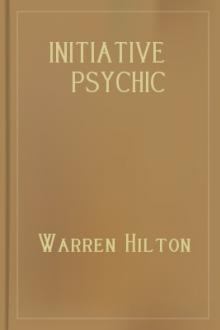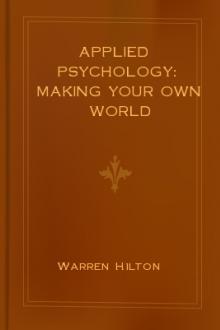author - "Warren Hilton"

elves, not after the usual manner of works on psychology, but solely from the standpoint of practical utility and for the establishment of a scientific concept of the mind capable of everyday use.[Sidenote: Fundamental Laws and Practical Methods] The elucidation of every principle of mental operation will be accompanied by illustrative material pointing out just how that particular law may be employed for the attainment of specific practical ends. There will be numerous illustrative instances

Your quickened step, your new-found decisiveness of action, your more observant eye, your clear-cut speech instead of the former drawling utterance, your livelier manner, your freshened enthusiasm and enjoyment of life--all of these are but manifestations of a quickened intelligence.[Sidenote: Quickened Mentality] They are the working out through the motor paths of mental impulses to muscular action. And these impulses to muscular action come thronging into consciousness because the livelier

ave previously taken special notice of what I now have an image of. For instance, when I have an image of a certain person I cannot tell his particular characteristics unless my attention was formerly directed to them.'"Another writes: 'There is no sound in connection with any image. In remembering, I call up an incident and gradually fill out the details. I can very seldom recall how anything sounds. One sound from the play "Robespierre," by Henry Irving, which I heard about two

must be, in the nature of things, a latent capacity greater than has yet been discovered. And one discovery must lead to another until the man finds the deep wealth of his own possibilities. History is full of the acts of men who discovered somewhat of their own capacity; but history has yet to record the man who fully discovered all that he might have been."[Sidenote: "Acres of Diamonds"] You who are a bit vain of your visits to other lands, your wide reading, your experience of

tion Process]The other aspect of the Sense-Perceptive Process has to do with the mental interpretation of environment. Both these aspects are distinctly practical. You should know something of the weaknesses and deficiencies of the sense-perceptive organs, because all your efforts at influencing other men are directed at their organs of sense. You should understand the relationship between your mind and your environment, since they are the two principal factors in your working life. CHAPTER III

p>The most important of these laws is the Law of Habit. In obedience to this law, the next idea to enter the mind will be the one that has been most frequently associated with the interesting part of the subject you are now thinking of.The sight of a pile of manuscript on your desk ready for the printer, the thought of a printer, the word "printer," spoken or printed, calls to mind the particular printer with whom you have been dealing for some years. The word "cocoa,"

elves, not after the usual manner of works on psychology, but solely from the standpoint of practical utility and for the establishment of a scientific concept of the mind capable of everyday use.[Sidenote: Fundamental Laws and Practical Methods] The elucidation of every principle of mental operation will be accompanied by illustrative material pointing out just how that particular law may be employed for the attainment of specific practical ends. There will be numerous illustrative instances

Your quickened step, your new-found decisiveness of action, your more observant eye, your clear-cut speech instead of the former drawling utterance, your livelier manner, your freshened enthusiasm and enjoyment of life--all of these are but manifestations of a quickened intelligence.[Sidenote: Quickened Mentality] They are the working out through the motor paths of mental impulses to muscular action. And these impulses to muscular action come thronging into consciousness because the livelier

ave previously taken special notice of what I now have an image of. For instance, when I have an image of a certain person I cannot tell his particular characteristics unless my attention was formerly directed to them.'"Another writes: 'There is no sound in connection with any image. In remembering, I call up an incident and gradually fill out the details. I can very seldom recall how anything sounds. One sound from the play "Robespierre," by Henry Irving, which I heard about two

must be, in the nature of things, a latent capacity greater than has yet been discovered. And one discovery must lead to another until the man finds the deep wealth of his own possibilities. History is full of the acts of men who discovered somewhat of their own capacity; but history has yet to record the man who fully discovered all that he might have been."[Sidenote: "Acres of Diamonds"] You who are a bit vain of your visits to other lands, your wide reading, your experience of

tion Process]The other aspect of the Sense-Perceptive Process has to do with the mental interpretation of environment. Both these aspects are distinctly practical. You should know something of the weaknesses and deficiencies of the sense-perceptive organs, because all your efforts at influencing other men are directed at their organs of sense. You should understand the relationship between your mind and your environment, since they are the two principal factors in your working life. CHAPTER III

p>The most important of these laws is the Law of Habit. In obedience to this law, the next idea to enter the mind will be the one that has been most frequently associated with the interesting part of the subject you are now thinking of.The sight of a pile of manuscript on your desk ready for the printer, the thought of a printer, the word "printer," spoken or printed, calls to mind the particular printer with whom you have been dealing for some years. The word "cocoa,"